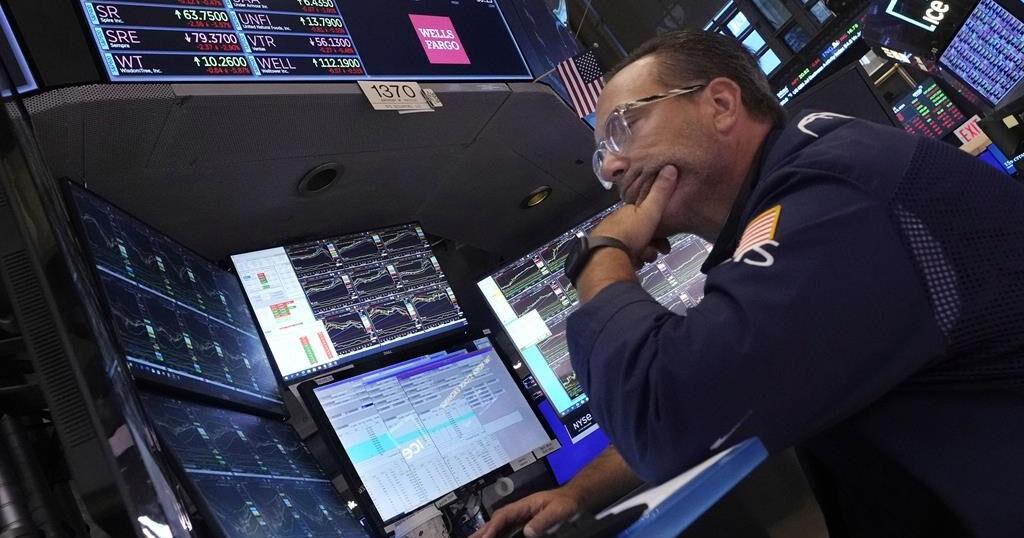It’s always good to buy insurance before you need it, as some investors might be realizing these days.
The sharp drop-off in markets earlier this weekadded to a more gradual recent decline that has put to the test just how well retail investor portfolios have hedge protection built in to soften the blow when stocks decline.
There are a growing number of choices to get some downside protection, and some old standbys are looking more effective, though they all require buying in ahead of time — or paying the price.
“Ifyou aren’t balanced and hedged all the time, then you find yourself in a spot now where it becomes more expensive,” said Dustin Reid, head of fixed income strategies at Mackenzie Investments.
“It’s probably still worth having some hedges on, but clearly the premium that you pay on those hedges are going to eat into your returns a fair bit more now than they would have six months ago.”
The volatility index, one possible ETF option Reid pointed to as a way to see some gains when equities decline, shows how quickly insurance prices can shift. After trading mostly around 13 in recent months, the CBOE Volatility Index shot up to above 65 on Monday before closing at almost 39, its highest level since the early pandemic panic. It’s since come down to roughly 26 as of Thursday morning, but that’s still a big markup from last week.
“Having VIX outright, or something like that, while equities are selling off, you’re probably not going to make up all of (the stock losses), but you’re going make up some of it,” said Reid.
Providing downward protection is also what’s offered by a relatively new product called a buffer exchange-traded fund.
The product provides downside protection through the use of option-hedging strategies that would otherwise be a little too advanced for average investors, though it comes at the cost of some of the upside as well.
BMO launched some buffered ETF options last October, which provide protection against the first 15 per cent of market declines while also capping gains at 10 per cent.
“It stems from us seeing this demand from our customer base to have some downside protection and being able to add an investment into your broader portfolio that gives you that peace of mind,” said Sara Petrcich, head of ETFs and structured solutions at BMO Global Asset Management.
She said the product is meant as a more conservative investment, making it especially suitable for investors later in life who maybe don’t have the long time horizons to wait out market declines, or for those who might want to take on risk in other areas.
“It’s just another tool in your kit so that you can have some downside protection. You’re cognizant of it, and then, you know, maybe you add a little bit more risk in different investments.”
The buffer ETFs offer the 15 per cent downside protection for a year on an S&P 500 reference index, based on where markets are when they’re issued. So an investor buying in now to the July offering has already lost some of that buffer.
Then there is the classic option of bonds, or fixed income, a category that fell out of favour with some investors in recent years as low returns turned into outright declines a couple of years back.
“That is still a bitter memory that lingers,” said David Rosenberg, head of Rosenberg Research.
But the losses came from a very unusual time in the fallout of the pandemic, when the entire 1970s inflation fight was stuffed into 18 months, said Rosenberg, while more recently they’ve been a good bet.He’s very bullish on fixed income.
“The bond market, it’s been a great place to be since last fall,” he said.
He’s worried that too few investors have rebalanced their portfolio during this bull run in stocks, as Canadians hold a record high 70 per cent of their financial assets in equities.
“We are in unprecedented territory and that is because throughout this entire bull market, diversification somehow became a dirty 15-letter word.”
Rosenberg said some have stayed away from fixed income over concerns inflation could come back, which would eat into returns, but he said that fear is misplaced.
“The reluctance to buy bonds really comes from the temptation to extrapolate your most recent experience into the future. And that typically is a mistake, because inflation is not coming back.”
He also likes precious metals as a hedge, though buying into gold these days also means buying at a market high.
For those who don’t want to move too far out of equities, Rosenberg recommends bond proxies on the stock market like utilities, pipelines, telecoms and select real estate trusts.
But he warns against being too heavy in stocks, saying the extra risk compared with the U.S. 10-year treasury doesn’t justify the investments.
“The bottom line is that, are you getting paid to take on the risk to be all-in on equities? And the answer is no, you’re not and you haven’t been for some time.”
He said investors should focus on building more insurance into their portfolios.
“I would recommend going forward that any reflexive rebound that we see in the stock market, that those proceeds be used right away to bring some semblance of sanity back to the household asset mix.”
This report by The Canadian Press was first published Aug. 8, 2024.
